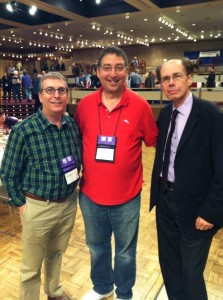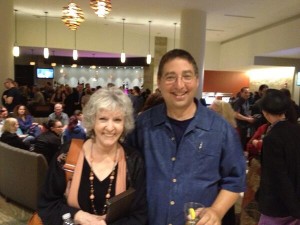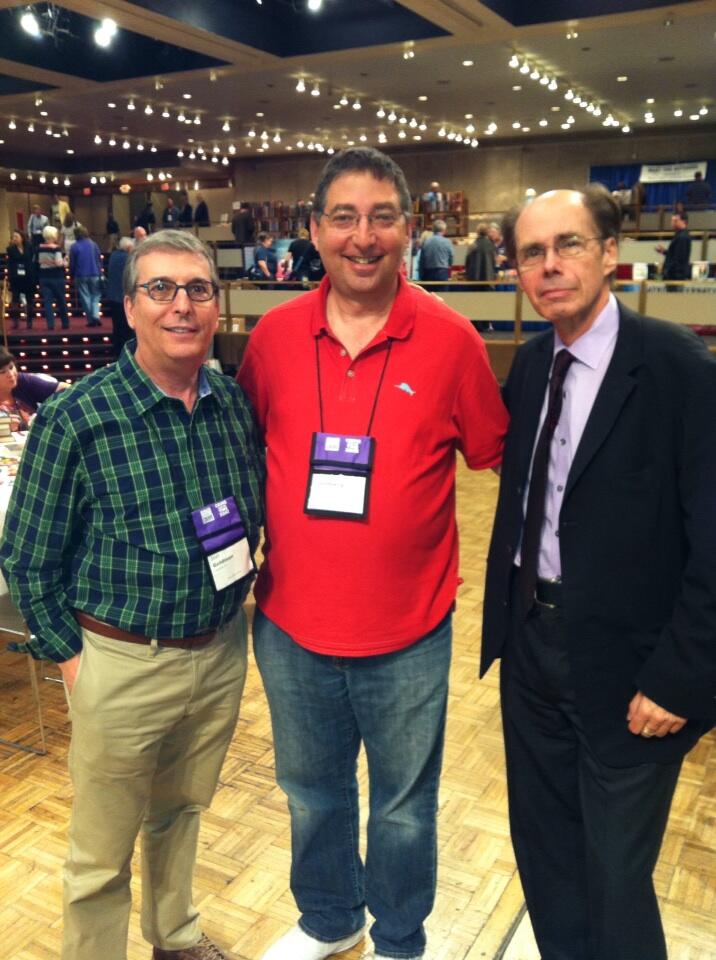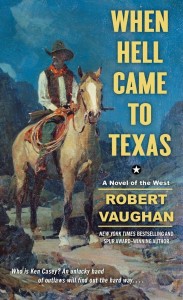
The success of a Bouchercon has less to do with the venue, and the organization of the conference, than with the collective vibe of the people who attend…which is a good thing, because this was the worst location, and the most poorly organized, Bouchercon I’ve ever been to. That said, the people were great and I had an absolutely terrific time.
So let’s start with the good part. I’m long past attending the Bouchercons for the panels or the special guests…I rarely go to any panels or interviews anymore. I go to Bouchercon to see old friends, to get introduced to new authors and new books, to meet with my editors and executives from the publishing companies that I work for, to buy books, to talk shop, and to pick up the latest news in my little corner of the industry. I spend almost all of my time in the book room, or in the corridors of the conference center, or going to parties, or hanging out for hours in the hotel bar, talking with editors, authors, readers and booksellers. I usually come away from the event re-energized, full of new ideas, and armed with a fresh understanding of the marketplace. All of that happened this time.
What I like best is when I bump into people I’ve long admired but have never met…like Dexter producer Clyde Phillips and Law & Order SVU writer Jonathan Greene… or have a chance encounter with authors I’ve never met before that leads to long and interesting conversations….and that happened with Chris Povone and Jamie Mason, among others…or get to meet enthusiastic readers of my books…and I met many of them. I was especially thrilled to hear how much they liked The Heist. What really surprised me was how many of those fans were men.
I chatted with scores of authors, including Sue Grafton, Harlan Coben, Joseph Finder, Alison Gaylin, Zoe Sharp,, Roger Hobbs, Jeffery Deaver, Tess Gerritsen, Matt Hilton, John Lawton, Lisa Lutz, Dick Lochte, Hannah Dennison, and Hy Conrad, to name just a few. The big topics of conversation, of course, revolved around the massive changes in the publishing industry…all prompted by the big elephant in the room: Amazon.

And Amazon was there in force… at least in terms of the editors from Amazon Publishing and their many authors in attendance, among them my friends Kendra Elliot, Melinda Leigh, 2013 Anthony award winner Johnny Shaw, John Rector, 2013 Anthony Award winner Dana Cameron, Sean Chercover, Joel Goldman, Max Allan Collins, and Helen Smith. But Amazon was also strongly represented by the many professional authors and attendees who are using KDP, their self-publishing platform, to republish their out-of-print backlists (in the case of the pros) as well as new books (in the case of pros and “newbies” alike), a list that includes big names like Lawrence Block, as well as lesser known, but successful, authors like Stacey Cochran.
There’s no question that the explosion of self-publishing, the emergence of Amazon’s imprints (two of their Thomas & Mecer authors scored Anthonys for best novel and best short story), and the Kindle device have changed everything…and authors trying to figure out where they fit in, where the best opportunities are, where the pitfalls are, and how all of this changes their approach to both the business and craft of writing. The big takeaway is that this is an exciting time to be a novelist…perhaps the best ever. Authors have choices they never had before, especially those of us who have been at this a while. But what about new authors? What is the path to success in this rapidly changing landscape? Where do agents fit into it all now? All of that is far less clear…at least from the vantage point of the Albany convention center last weekend.

Which brings me to the venue, which had all the charm of a bus station men’s room, minus the urinals. The windowless pit was buried beneath the Empire State Plaza, which looked like a matte painting from a busted, 1970s Gene Roddenberry sf pilot. Finding your way into that bleak pit required a sherpa… or directions from one of the many crack addicts, toothless meth-heads, smelly panhandlers or opportunistic drug dealers on the streets surrounding the far-flung hotels where everybody had to stay (the convention center was virtually inaccessible for the handicapped). The conference rooms where the panels were held had terrible accoustics and the ambiance of police interrogation cells. The only author who probably felt at home in them was Marcia Clark.
Because bleak, destitute downtown Albany revolves around government workers, everything shuts down early in the afternoon and is closed up on weekends…those few places that already boarded up or out-of-business… meaning there was no place to eat on Saturday and Sunday….unless you wanted to wander into crack alley for a soggy burger or go back to the understaffed, woefully unprepared Hilton Albany, the nearest hotel…where even if you got served, it was a crapshoot whether inedible meal that was delivered was the one you actually ordered. The bar was even worse.
What were the Bouchercon organizers thinking when they picked this shithole? Who knows. But I can tell you this, Long Beach next year will be a big improvement…and I’ve already booked my tickets.


